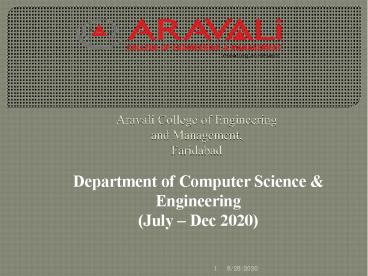Aravali college of Engineering and Management, Faridabad (4) - PowerPoint PPT Presentation
Title:
Aravali college of Engineering and Management, Faridabad (4)
Description:
Session on machine learning – PowerPoint PPT presentation
Number of Views:6
Title: Aravali college of Engineering and Management, Faridabad (4)
1
Aravali College of
Engineering and Management, Faridabad
- Department of Computer Science
Engineering(July Dec 2020)
2
Learning
3
What is Learning?
- Learning denotes changes in a system that ...
enable a system to do the same task more
efficiently the next time. - Learning is constructing or modifying
representations of what is being experienced. - Learning is making useful changes in our minds.
- Machine learning refers to a system capable of
the autonomous acquisition and integration of
knowledge.
4
Learning Process
5
Learning system in Machine Learning
6
Machine Learning
- Field of study that gives computers the ability
to learn without being explicitly programmed - Arthur Samuel (1959)
- A computer program is said to learn from
experience E with respect to some class of tasks
T and performance measure P, if its performance
at tasks in T, as measured by P, improves with
experience E - Tom M. Mitchell (1998)
7
Understanding Machine Learning from daily life
applications
8
Machine Learning
- Machine learning is a subfield of computer
science that explores the study and construction
of algorithms that can learn from and make
predictions on data. - Such algorithms operate by building a model from
example inputs in order to make data- driven
predictions or decisions, rather than following
strictly static program instructions
9
Understanding the Concept of Machine Learning
10
Example Spam Mail Detection
- A computer program is said to learn from
experience E with respect to some class of tasks
T and performance measure P, if its performance
at tasks in T, as measured by P, improves with
experience E - In our project,
- T classify emails as spam or not spam
- E watch the user label emails as spam or not
spam
11
Applications of Machine Learning
- Facial recognition
12
Applications of Machine Learning
- Self-customizing programs (Netflix, Amazon, etc.)
13
Why Machine Learning?
- No human experts
- industrial/manufacturing control
- mass spectrometer analysis, drug design,
astronomic discovery - Black-box human expertise
- face/handwriting/speech recognition
- driving a car, flying a plane
- Rapidly changing phenomena
- credit scoring, financial modeling
- diagnosis, fraud detection
- Need for customization/personalization
- personalized news reader
- movie/book recommendation
14
How Machine Learning Different from Artificial
Intelligence
15
Types Of Machine Learning
- Supervised learning Learn by examples as to
what a face is in terms of structure, color, etc
so that after several iterations it learns to
define a face. - Unsupervised learning since there is no
desired output in this case that is provided
therefore categorization is done so that the
algorithm differentiates correctly between the
face of a horse, cat or human.
16
Types of Machine Learning
- REINFORCEMENT LEARNING
- Learn how to behave successfully to achieve a
goal while interacting with an external
environment .(Learn via Experiences!)
17
- Supervised learning is the machine learning task
of inferring a function from labeled training
data. The training data consist of a set of
training examples. In supervised learning, each
example is a pair consisting of an input object
and a desired output value. A supervised
learning algorithm analyzes the training data
and produces an inferred function, which can be
used for mapping new examples.
18
Supervised Learning
19
(No Transcript)
20
- Regression means to predict the output value
using training data. - Classification means to group the output into a
class. - e.g. we use regression to predict the house
price from training data and use classification
to predict the Gender.
21
(No Transcript)
22
- Applications for supervised Learning
- Risk assessment - Supervised learning is used to
assess the risk - in financial services or insurance domains in
order to minimize the - risk portfolio of the companies.
- Image classification - Image classification is
one of the key use - cases of demonstrating supervised machine
learning. For example, - Facebook can recognize your friend in a picture
from an album of - tagged photos.
- Fraud detection - To identify whether the
transactions made by the user are authentic or
not. - Visual recognition - The ability of a machine
learning model to identify objects, places,
people, actions and images.
23
Unsupervised Machine Learning In Unsupervised
Learning, the machine uses unlabeled data and
learns on itself without any supervision. The
machine tries to find a pattern in the unlabeled
data and gives a response.
24
Supervised and Unsupervised Learning
25
Aravali College of Engineering And
Management Jasana, Tigoan Road, Neharpar,
Faridabad, Delhi NCR Toll Free Number 91-
8527538785 Website www.acem.edu.in































